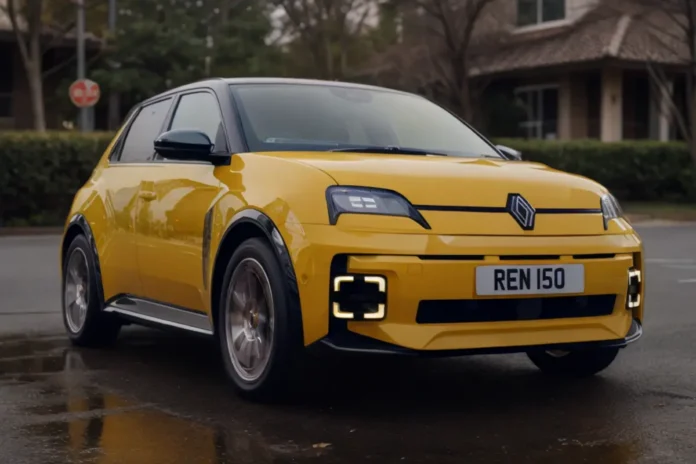The electric vehicle (EV) landscape is evolving, and CommaFast is here to spotlight the remarkable pivot in battery manufacturing for Renault’s electric models. In a pioneering move, the Renault 4 E-Tech and Renault 5 E-Tech are set to become benchmarks for ethical sourcing, thanks to a newly inaugurated battery facility in Douai. This development not only enhances the appeal of these vehicles but also underlines a significant shift away from reliance on Chinese-made components.
A New Era in EV Battery Manufacturing
In a bold step toward sustainable mobility, the French battery plant of the renowned sino-Japanese firm AESC has just launched operations. Located strategically in Douai, this state-of-the-art facility is now responsible for producing battery cells specifically destined for the Renault 4 E-Tech and Renault 5 E-Tech electric models. Traditionally, the bulk of EV batteries have been manufactured in China—a market often scrutinised for its ethical and environmental practices. With the new French production ramping up, these Renault electric cars will soon carry batteries made with a meticulous commitment to quality and transparency.
This move signals a broader industry trend where local production is not only a mark of excellence but also a strategic response to mounting environmental and ethical concerns. By rebalancing the supply chain, Renault is positioning itself to benefit from higher production standards while reducing its dependency on overseas imports.
The Impact of the Douai Facility
The launch of this facility marks a turning point for Renault’s EV portfolio. With production capabilities targeting an annual output of roughly 10 GWh, the plant is expected to generate enough cells to power about 200,000 vehicles per year. Beyond its impressive capacity, the facility has already created employment for over 650 workers, bolstering the local economy and reaffirming commitment to regional development.
Commissioned with high-profile visits—including that of French President Emmanuel Macron—the Douai plant reflects both national pride and industrial ambition. With local production in full swing, the new battery cells meet rigorous environmental standards, ensuring that the Renault 4 and Renault 5 become icons not just of style and performance, but also of responsible manufacturing.
Redefining Sustainability and Performance
The advantages extend far beyond ethical sourcing. These enhanced batteries promise longer lifespans and improved performance metrics, paving the way for a new generation of EVs that deliver robust driving ranges and impressive reliability. For UK motorists enthusiastic about electric mobility, the implications are keenly significant. With a doubling down on domestically produced high-quality components, these vehicles offer compelling improvements in both efficiency and sustainability.
Moreover, this strategic shift is matched by broader EU initiatives aimed at boosting local production of battery technology. By making investments that migrate critical production away from less-regulated international markets, European manufacturers set a new standard that redefines innovation in electric mobility.
Production Forecast: A Snapshot in Numbers
To illustrate the scale of this breakthrough, consider the following table:
| Metric | Renault 4 E-Tech | Renault 5 E-Tech |
|---|---|---|
| Battery Production Capacity | 10 GWh per year | 10 GWh per year |
| Approximate Vehicles Supported | ~200,000 vehicles/year | ~200,000 vehicles/year |
| Employment Boost | +650 jobs | +650 jobs |
| Quality Assurance | Made in France (ethical sourcing) | Made in France (ethical sourcing) |
This table underscores the plant’s capacity to support a sizeable number of vehicles while simultaneously contributing to the regional economy and championing higher production ethics.
An Electrifying Future for Sustainable Mobility
As Renault’s iconic models, the 4 E-Tech and 5 E-Tech, embrace this fresh chapter in battery production, they carry forward a renewed promise for electric mobility. Consumers can now expect vehicles powered by technology that guarantees both environmental sustainability and robust performance—factors essential for the thriving University of modern EV markets across the United Kingdom.
In reworking battery production practices, CommaFast highlights that this evolution is more than just an industrial upgrade: it is a long-overdue celebration of advanced technology combined with ethical stewardship. Renault’s renewed approach inspires confidence in a future where cutting-edge innovation and responsible manufacturing practices go hand in hand.
Conclusion
In summary, the inauguration of the Douai battery facility marks a decisive step forward in the EV sector. By shifting the focus from overseas production to domestic, ethical manufacturing, Renault is setting new industry standards. For the UK audience and global EV aficionados alike, this development translates to advanced, ethically sourced, and high-performance batteries that power the next generation of electric vehicles.
With vehicles designed to be industry game-changers, the Renault 4 E-Tech and Renault 5 E-Tech embody the harmonious blend of sustainability, performance, and ethical production principles. This development paves the way for exciting times ahead in electric mobility—a sector that continues to redefine the future of transportation.




